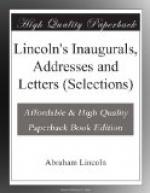McLean or Curtis. John McLean and Benjamin R. Curtis were the only justices who were strongly opposed to the Dred Scott decision. Curtis, who was a Whig from Massachusetts and who resigned the same year, wrote a minority decision.
Chase and Mace. Salmon P. Chase was at that time Senator from Ohio. Daniel Mace was a Democrat representative, who was opposed to the Nebraska Bill.
Judge Nelson. Samuel Nelson, a justice of the Supreme Court.
“A living dog is better than a dead lion.” Ecclesiastes ix. 4.
THE FREEPORT DEBATE.
The Lincoln-Douglas Joint Debates took place in seven towns in various parts of Illinois between August 21 and October 15, 1858. The proposal for these meetings was made by Lincoln in a note addressed to Douglas. The length of each debate and the division of time between the speakers are stated in the opening sentence of the speech given in the text. The speeches, which were all extempore, as far as the actual form is concerned, were later collected from the newspaper reports, and after some slight revision by the authors were published in 1860 in Columbus, Ohio. This volume, from which the present text is taken, contained in addition a number of speeches delivered by Lincoln and Douglas earlier in 1858 and two speeches made by Lincoln in Ohio in 1859. Lincoln’s statement at the close of a letter to the publishers, accompanying the copy for the book, is characteristic and interesting: “I wish the reprint to be precisely as the copies I send, without any comment whatever.” This Columbus issue was used as a Republican campaign document and large numbers were sold.
The Freeport Debate, the second in the series, was held on the afternoon of August 27. With the exception of the Galesburg Debate, it was the most largely attended of the seven meetings, and in its effect upon the campaign it is now regarded as the most important.
Judge Douglas and myself. In the informal speeches Lincoln frequently committed errors of speech like this. Even during the presidential period he shows a marked tendency to use the cleft infinitive. But in the carefully written addresses the language is almost always correct.
Fugitive Slave law. This statute was passed in 1850 for the stricter regulation of the return of escaped slaves to their owners. In his answer to this question Lincoln showed clearly that he was not an Abolitionist, as that term was then understood.
Question 2. Douglas’ reply to this question was as follows: “I answer emphatically, as Mr. Lincoln has heard me answer a hundred times from every stump in Illinois that in my opinion the people of a territory can, by lawful means, exclude slavery from their limits prior to the formation of a State Constitution.” It is claimed that this question was put by Lincoln in spite of the protests of several of his friends, who believed that it would give Douglas an advantage. But here, as in the equally feared Springfield Speech, Lincoln proved his superior sagacity. Douglas’ affirmative answer probably gained him the senatorship, but it certainly lost him the presidency two years later.




